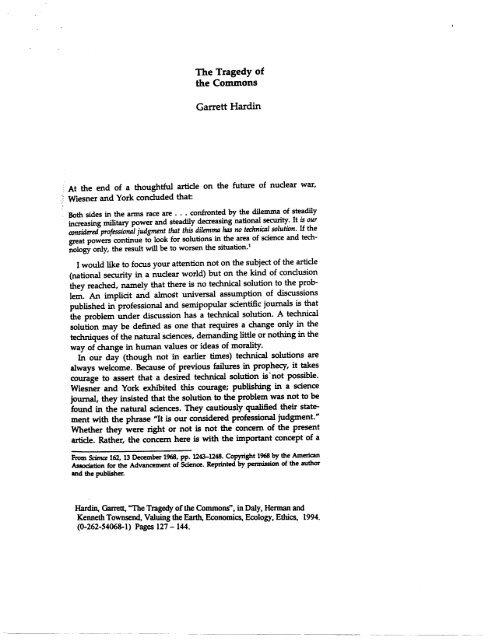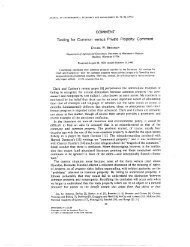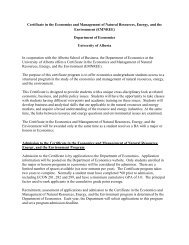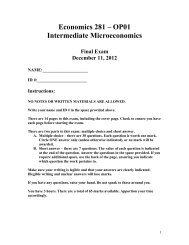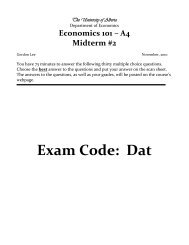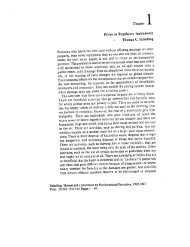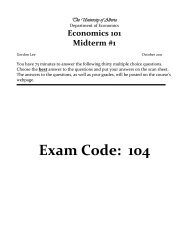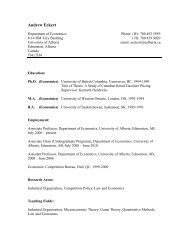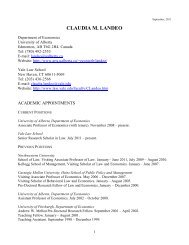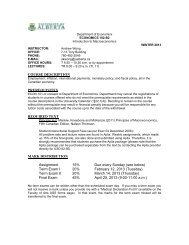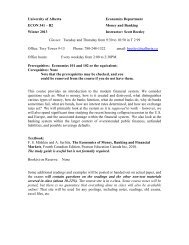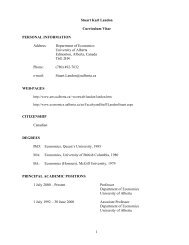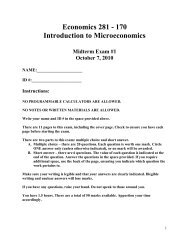The Tragedy of the Commons Garrett Hardin - University of Alberta
The Tragedy of the Commons Garrett Hardin - University of Alberta
The Tragedy of the Commons Garrett Hardin - University of Alberta
You also want an ePaper? Increase the reach of your titles
YUMPU automatically turns print PDFs into web optimized ePapers that Google loves.
<strong>The</strong> <strong>Tragedy</strong> <strong>of</strong><strong>the</strong> <strong>Commons</strong><strong>Garrett</strong> <strong>Hardin</strong>.At <strong>the</strong> end <strong>of</strong> a thoughtful article on <strong>the</strong> future <strong>of</strong> nuclear war,Wiesner and York concluded that:Both sides in <strong>the</strong> arms race are . . . confronted by <strong>the</strong> dilemma <strong>of</strong> steadilyincreasing military power and steadily decreasing national security. It is OUTconsideredpr<strong>of</strong>essionaljudgment that this dilem71Ul has no technicalsolution. If <strong>the</strong>great powers continue to look for solutions in <strong>the</strong> area <strong>of</strong> science and technologyonly, <strong>the</strong> result will be to worsen <strong>the</strong> situation. 1I would like to focus your attention not on <strong>the</strong> subject <strong>of</strong> <strong>the</strong> article(national security in a nuclear world) but on <strong>the</strong> kind <strong>of</strong> conclusion<strong>the</strong>y reached, namely that <strong>the</strong>re is no technical solution to <strong>the</strong> problem.An implicit and almost universal assumption <strong>of</strong> discussionspublished in pr<strong>of</strong>essional and semipopular scientific journals is that<strong>the</strong> problem under discussion has a technical solution. A technicalsolution may be defined as one that requires a change only in <strong>the</strong>techniques <strong>of</strong> <strong>the</strong> natural sciences, demanding little or nothing in <strong>the</strong>way <strong>of</strong> change in human values or ideas <strong>of</strong> morality.In our day (though not in earlier times) technical solutions arealways welcome. Because <strong>of</strong> previous failures in prophecy, it takescourage to assert that a desired technical solution is' not possible.Wiesner and York exhibited this courage; publishing in a sciencejournal, <strong>the</strong>y insisted that <strong>the</strong> solution to <strong>the</strong> problem was not to befound in <strong>the</strong> natural sciences. <strong>The</strong>y cautiously qualified <strong>the</strong>ir statementwith <strong>the</strong> phrase '1t is our considered pr<strong>of</strong>essional judgment."Whe<strong>the</strong>r <strong>the</strong>y were right or not is not <strong>the</strong> concern <strong>of</strong> <strong>the</strong> presentarticle. Ra<strong>the</strong>r, <strong>the</strong> concern here is with <strong>the</strong> important concept <strong>of</strong> aFrom Sdena 162, 13 December 1968, pp. 1243-1248. Copyright 1968by <strong>the</strong> AmericanAssociation for <strong>the</strong> Advancement <strong>of</strong> Science. Reprinted by permission <strong>of</strong> <strong>the</strong> authormd <strong>the</strong> publisher.<strong>Hardin</strong>, <strong>Garrett</strong>, "<strong>The</strong> <strong>Tragedy</strong> <strong>of</strong> <strong>the</strong> <strong>Commons</strong>", in Daly, Hennan andKenneth Townsend, Valuing <strong>the</strong> Earth, Economics, Ecology, Ethics, 1994.(0-262-54068-1) Pages 127 - 144.
<strong>Garrett</strong> <strong>Hardin</strong>128<strong>The</strong> <strong>Tragedy</strong> <strong>of</strong> <strong>the</strong> <strong>Commons</strong>129class <strong>of</strong> human problems which can be called "no technical solutionproblems," and, more specifically, with <strong>the</strong> identification and discussion<strong>of</strong> one <strong>of</strong> <strong>the</strong>se.It is easy to show that <strong>the</strong> class is not a null class. Recall<strong>the</strong> game '<strong>of</strong> tick-tack-toe. Consider <strong>the</strong> problem "How can I win <strong>the</strong> game <strong>of</strong> ;'tick-tack-toe?" It is well known that I cannot, if I assume (in keepingwith <strong>the</strong> conventions <strong>of</strong> game <strong>the</strong>ory) that my opponent understands<strong>the</strong> game perfectly. Put ano<strong>the</strong>r way, <strong>the</strong>re is no "technical solution"to <strong>the</strong> problem. I can win only by giving a radical meaning to <strong>the</strong>word "win." I can hit my opponent over <strong>the</strong> head; or I can drug him;or I can falsify <strong>the</strong> records. Every way in which I "win" involves, insome sense, an abandonment <strong>of</strong> <strong>the</strong> game, as we intuitively understandit. (I can also, <strong>of</strong> course, openly abandon <strong>the</strong> game, refuse toplay it. This is what most adults do.)<strong>The</strong> class <strong>of</strong> "no technical solution problems" has members. My<strong>the</strong>sis is that <strong>the</strong> "population problem," as conventionally conceived,is a member <strong>of</strong> this class. How it is conventionally conceived needssome comment. It is fair to say that most people who anguish over<strong>the</strong> population problem are trying to find a way to avoid <strong>the</strong> evils <strong>of</strong>overpopulation without relinquishing any <strong>of</strong> <strong>the</strong> privileges <strong>the</strong>y nowenjoy. <strong>The</strong>y think that fanning <strong>the</strong> seas or developing new strains <strong>of</strong>wheat will solve <strong>the</strong> problem-technologically. I try to show herethat <strong>the</strong> solution <strong>the</strong>y seek cannot be found. <strong>The</strong> population problemcannot be solved in a technical way, any more than can <strong>the</strong> problem<strong>of</strong> winning <strong>the</strong> game <strong>of</strong> tick-tack-toe.What Shall We Maximize?Population, as Malthus said, naturally tends to grow "geometrically,"or, as we would now say, exponentially. In a finite world this meansthat <strong>the</strong> per capita share <strong>of</strong> <strong>the</strong> world's goods must steadily decrease.Is ours a finite world?A fair defense can be put forward for <strong>the</strong> view that <strong>the</strong> world isinfinite; or that we do not know that it is not. But, in terms <strong>of</strong> <strong>the</strong>practical problems that we must face in <strong>the</strong> next few generationswith <strong>the</strong> foreseeable technology, it is clear that we will greatlyincrease human misery if we do not, during <strong>the</strong> immediate future,assume that <strong>the</strong> world available to <strong>the</strong> terrestrial human populationis finite. "Space" is no escape.2\.~A finite world can support only a finite population; <strong>the</strong>refore,population growth must eventually equal zero. (<strong>The</strong> case <strong>of</strong> perpetualwide fluctuations above and below zero is a trivial variant that neednot be discussed.) When this condition is met, what will be <strong>the</strong>situation <strong>of</strong> mankind? Specifically, can Bentham's goal <strong>of</strong> "<strong>the</strong> greatestgood for <strong>the</strong> greatest number" be realized?N~for two reasons, each sufficient by itself. <strong>The</strong> first is a <strong>the</strong>oreticalone.It is not ma<strong>the</strong>matically possible to maximize for two (ormore) variables at <strong>the</strong> same time. This was clearly stated by vonNeumann and Morgenstem,3 but <strong>the</strong> principle is implicit in <strong>the</strong> <strong>the</strong>ory<strong>of</strong> partial differential equations, dating back at least to 0' Alembert(1717-1783).<strong>The</strong> second reason springs directly from biological facts. To live,any organism must have a source <strong>of</strong> energy (for example, food). Thisenergy is utilized for two purposes: mere maintenance and work.For man, maintenance <strong>of</strong> life requires about 1,600 kilocalories a day("maintenance calories"). Anything that he does over and abovemerely staying alive will be defined as work, and is supported by"work calories" which he takes in. Work calories are used not onlyfor what we call work in common speech; <strong>the</strong>y are also required foraU forms <strong>of</strong> enjoyment, from swimming and automobile racing toplaying music and writing poetry. If our goal is to maximize populationit is obvious what we must do: We must make <strong>the</strong> work caloriesper person approach as close to zero as possible. No gourmet meals,no vacations, no sports, no music, no literature, no art. . . . I thinkthat everyone will grant, without argument or pro<strong>of</strong>, that maximizingpopulation does not maximize goods. Bentham's goal is impossible.In reaching this conclusion I have made <strong>the</strong> usual assumption thatit is <strong>the</strong> acquisition <strong>of</strong> energy that is <strong>the</strong> problem. <strong>The</strong> appearance <strong>of</strong>atomic energy has led some to question this assumption. However,given an infinite source <strong>of</strong> energy, population growth still producesan inescapable problem. <strong>The</strong> problem <strong>of</strong> <strong>the</strong> acquisition <strong>of</strong> energy isreplaced by <strong>the</strong> problem <strong>of</strong> its dissipation, as J. H. Fremlin has sowittily shown.. <strong>The</strong> arithmetic signs in <strong>the</strong> analysis are, as it were,reversed; but Bentham's goal is still unobtainable.<strong>The</strong> optimum population is, <strong>the</strong>n, less than <strong>the</strong> maximum. <strong>The</strong>difficulty <strong>of</strong> defining <strong>the</strong> optimum is enormous; so far as I know, noone has seriously tackled this problem. Reaching an acceptable andstable solution will surely require more than one generation <strong>of</strong> hardanalytical work-and much persuasion.
<strong>Garrett</strong> <strong>Hardin</strong>130 <strong>The</strong> <strong>Tragedy</strong> <strong>of</strong> <strong>the</strong> <strong>Commons</strong>131We want <strong>the</strong> maximum good per person; but what is good? To oneperson it is wilderness, to ano<strong>the</strong>r it is ski lodges for thousands. Toone it is estuaries to nourish ducks for hunters to shoot; to ano<strong>the</strong>rit is factory land. Comparing one good with ano<strong>the</strong>r is, we usuallysay, impossible because goods are incommensurable. Incommensurabiescannot be compared.<strong>The</strong>oretically this may be true; but in real life incommensurablesare commensurable. Only a criterion <strong>of</strong> judgment and a system <strong>of</strong>weighting are needed. In nature <strong>the</strong> criterion is survival. Is it betterfor a species to be small and hidable, or large and powerful? Naturalselection commensurates <strong>the</strong> incommensurables. <strong>The</strong> compromiseachieved depends on a natural weighting <strong>of</strong> <strong>the</strong> values <strong>of</strong> <strong>the</strong>variables.Man must imitate this process. <strong>The</strong>re is no doubt that in fact healready does, but unconsciously. It is when <strong>the</strong> hidden decisions aremade explicit that <strong>the</strong> arguments begin. <strong>The</strong> problem for <strong>the</strong> yearsahead is to work out an acceptable <strong>the</strong>ory <strong>of</strong> weighting. Synergisticeffects, nonlinear variation, and difficulties in discounting <strong>the</strong> futuremake <strong>the</strong> intellectual problem difficult, but not (in principle)insoluble.Has any cultural group solved this practical problem at <strong>the</strong> presenttime, even on an intuitive level? One simple fact proves that nonehas: <strong>the</strong>re is no prosperous population in <strong>the</strong> world today that has,and has had for some time, a growth rate <strong>of</strong> zero. Any people thathas intuitively identified its optimum point will soon reach it, afterwhich its growth rate becomes and remains zero. 5Of course, a positive growth rate might be taken as evidence thata population is below its optimum. However, by any reasonablestandards,<strong>the</strong> most rapidly growing populations on earth today are(in general) <strong>the</strong> most miserable. This association (which need not beinvariable) casts doubt on <strong>the</strong> optimistic assumption that <strong>the</strong> positivegrowth rate <strong>of</strong> a population is evidence that it has yet to reach itsoptimum.We can make little progress in working toward optimum populationsize until we explicitly exorcize <strong>the</strong> spirit <strong>of</strong> Adam Smith in <strong>the</strong>field <strong>of</strong> practical demography. In economic affairs, <strong>The</strong> Wealth <strong>of</strong>Nations (1776) popularized <strong>the</strong> "invisible hand," <strong>the</strong> idea that anindividual who "intends only his own gain" is, as it were, "Ied byan invisible hand to promote . . . <strong>the</strong> public interest."6 Adam Smithdid not assert that this was invariably true, and perhaps nei<strong>the</strong>r didany <strong>of</strong> his followers. But he contributed to a dominant tendency <strong>of</strong>thought that has ever since interfered with positive action based onrational analysis, namely, <strong>the</strong> tendency to assume that decisionsreached individually will, in fact, be <strong>the</strong> best decisions for an entiresociety. If this assumption is correct it justifies <strong>the</strong> continuance <strong>of</strong>our present policy <strong>of</strong> laissez-faire in reproduction. If it is correct wecan assume that men will control <strong>the</strong>ir individual fecundity so as toproduce <strong>the</strong> optimum population. If <strong>the</strong> assumption is not correct,we need to reexamine our individual freedoms to see which ones aredefensible.<strong>The</strong> <strong>Tragedy</strong> <strong>of</strong> Freedom in a <strong>Commons</strong><strong>The</strong> rebuttal to <strong>the</strong> invisible hand in population control is to be foundin a scenario first sketched in a little-known pamphlet in 1833 by ama<strong>the</strong>matical amateur named William Forster Lloyd (1794-1852).7Wemay well call it "<strong>the</strong> tragedy <strong>of</strong> <strong>the</strong> commons," using <strong>the</strong> word"tragedy" as <strong>the</strong> philosopher Whitehead used it: "<strong>The</strong> essence <strong>of</strong>dramatic tragedy is not unhappiness. It resides in <strong>the</strong> solemnity <strong>of</strong><strong>the</strong> remorseless working <strong>of</strong> things." He <strong>the</strong>n goes on to say, "Thisinevitableness <strong>of</strong> destiny can only be illustrated in terms <strong>of</strong> humanlife by incidents which in fact involve unhappiness. For it is only by<strong>the</strong>m that <strong>the</strong> futility <strong>of</strong> escape can be made evident in <strong>the</strong> drama."e<strong>The</strong> tragedy <strong>of</strong> <strong>the</strong> commons develops in this way. Picture a pastureopen to all. It is to be expected that each herdsman will try to keepas many cattle as possible on <strong>the</strong> commons. Such an arrangementmay work reasonably satisfactorily for centuries because tribal wars,poaching, and disease keep <strong>the</strong> numbers <strong>of</strong> both man and beast wellbelow <strong>the</strong> carrying capacity <strong>of</strong> <strong>the</strong> land. Finally, however, comes <strong>the</strong>day <strong>of</strong> reckoning, that is, <strong>the</strong> day when <strong>the</strong> long-desired goal <strong>of</strong>social stability becomes a reality. At this point, <strong>the</strong> inherent logic <strong>of</strong><strong>the</strong> commons remorselessly generates tragedy.As a rational being, each herdsman seeks to maximize his gain.Explicitly or implicitly, more or less consciously, he asks, "What is<strong>the</strong> utility to me <strong>of</strong> adding one more animal to my herd?" This utilityhas one negative and one positive component.1. <strong>The</strong> positive component is a function <strong>of</strong> <strong>the</strong> increment <strong>of</strong> oneanimal. Since <strong>the</strong> herdsman receives all <strong>the</strong> proceeds from <strong>the</strong> sale<strong>of</strong> <strong>the</strong> additional animal, <strong>the</strong> positive utility is nearly + 1.
<strong>Garrett</strong> <strong>Hardin</strong>132 <strong>The</strong> <strong>Tragedy</strong> <strong>of</strong> <strong>the</strong> <strong>Commons</strong> 1332. <strong>The</strong> negative component is a function <strong>of</strong> <strong>the</strong> additional overgrazingcreated by one more animal. Since, however, <strong>the</strong> effects <strong>of</strong> overgrazingare shared by aU <strong>the</strong> herdsmen, <strong>the</strong> negative utility for anyparticular decision-making herdsman is only a fraction <strong>of</strong> -l.Adding toge<strong>the</strong>r <strong>the</strong> component partial utilities, <strong>the</strong> rational herdsmanconcludes that <strong>the</strong> only sensible course for him to pursue is toadd ano<strong>the</strong>r animal to his herd. And ano<strong>the</strong>r; and ano<strong>the</strong>r. . . . Butthis is <strong>the</strong> conclusion reached by each and every rational herdsmansharing a commons. <strong>The</strong>rein is <strong>the</strong> tragedy. Each man is locked intoa system that compels him to increase his herd without limit-in aworld that is limited. Ruin is <strong>the</strong> destination toward which all menrush, each pursuing his own best interest in a society that believesin <strong>the</strong> freedom <strong>of</strong> <strong>the</strong> commons. Freedom in a commons brings ruinto all.Some would say that this is a platitude. Would that it were! In asense, it was learned thousands <strong>of</strong> years ago, but natural selectionfavors <strong>the</strong> forces <strong>of</strong> psychological denial.9 <strong>The</strong> individual benefits asan individual from his ability to deny <strong>the</strong> truth even though societyas a whole, <strong>of</strong> which he is a part, suffers. Education can counteract<strong>the</strong> natural tendency to do <strong>the</strong> wrong thing, but <strong>the</strong> inexorablesuccession <strong>of</strong> generations requires that <strong>the</strong> basis for this knowledgebe constantly refreshed.A simple incident that occurred a few years ago in Leominster,Massachusetts, shows how perishable <strong>the</strong> knowledge is. During <strong>the</strong>Christmas shopping season <strong>the</strong> parking meters downtown were coveredwith plastic bags that bore tags reading: "00 not open untilafter Christmas. Free parking courtesy <strong>of</strong> <strong>the</strong> mayor and city council."In o<strong>the</strong>r words, facing <strong>the</strong> prospect <strong>of</strong> an increased demand foralready scarce space, <strong>the</strong> city fa<strong>the</strong>rs reinstituted <strong>the</strong> system <strong>of</strong> <strong>the</strong>commons. (Cynically, we suspect that <strong>the</strong>y gained more votes than<strong>the</strong>y lost by this retrogressive act.)In an approximate way, <strong>the</strong> logic <strong>of</strong> <strong>the</strong> commons has been understoodfor a long time, perhaps since <strong>the</strong> discovery <strong>of</strong> agriculture or<strong>the</strong> invention <strong>of</strong> private property in real estate. But it is understoodmostly only in special cases which are not sufficiently generalized.Even at this late date, cattlemen leasing national land on <strong>the</strong> westernranges demonstrate no more than an ambivalent understanding, inconstantly pressuring federal authorities to increase <strong>the</strong> head countto <strong>the</strong> point where overgrazing produces erosion and weed domi-nance. Likewise, <strong>the</strong> oceans <strong>of</strong> <strong>the</strong> world continue to suffer from <strong>the</strong>survival <strong>of</strong> <strong>the</strong> philosophy <strong>of</strong> <strong>the</strong> commons. Maritime nations stillrespond automatically to <strong>the</strong> shibboleth <strong>of</strong> <strong>the</strong> "freedom <strong>of</strong> <strong>the</strong> seas."Pr<strong>of</strong>essing to believe in <strong>the</strong> "inexhaustible resources <strong>of</strong> <strong>the</strong> oceans,"<strong>the</strong>y bring species after species <strong>of</strong> fish and whales closer toextinction. to<strong>The</strong> national parks present ano<strong>the</strong>r instance <strong>of</strong> <strong>the</strong> working out <strong>of</strong><strong>the</strong> tragedy <strong>of</strong> <strong>the</strong> commons. At present, <strong>the</strong>y are open to all, withoutlimit. <strong>The</strong> parks <strong>the</strong>mselves are limited in extent-<strong>the</strong>re is only oneYosemite Valley-whereas population seems to grow without limit.<strong>The</strong> values that visitors seek in <strong>the</strong> parks are steadily eroded. Plainly,we must soon cease to treat <strong>the</strong> parks as commons or <strong>the</strong>y will be <strong>of</strong>no value to anyone.What shall we do? We have several options. We might sell <strong>the</strong>m<strong>of</strong>f as private property. We might keep <strong>the</strong>m as public property, butallocate <strong>the</strong> right to enter <strong>the</strong>m. <strong>The</strong> allocation might be on <strong>the</strong> basis<strong>of</strong> wealth by <strong>the</strong> use <strong>of</strong> an auction system. It might be on <strong>the</strong> basis<strong>of</strong> merit, as defined by some agreed-upon standards. It might be bylottery. Or it might be on a first-come, first-served basis, administeredto long queues. <strong>The</strong>se, I think, are all <strong>the</strong> reasonable possibilities.<strong>The</strong>y are all objectionable. But we must choos~r acquiesce in <strong>the</strong>destruction <strong>of</strong> <strong>the</strong> commons that we call our national parks.PollutionIn a reverse way, <strong>the</strong> tragedy <strong>of</strong> <strong>the</strong> commons reappears in problems<strong>of</strong> pollution. Here it is not a question <strong>of</strong> taking something out <strong>of</strong> <strong>the</strong>commons, but <strong>of</strong> putting something in-sewage, or chemical,radioactive, and heat wastes into water; noxious and dangerousfumes into <strong>the</strong> air; and distracting and unpleasant advertising signsinto <strong>the</strong> light <strong>of</strong> sight. <strong>The</strong> calculations <strong>of</strong> utility are much <strong>the</strong> sameas before. <strong>The</strong> rational man finds that his share <strong>of</strong> <strong>the</strong> cost <strong>of</strong> <strong>the</strong>wastes he discharges into <strong>the</strong> commons is less than <strong>the</strong> cost <strong>of</strong>purifying his wastes before releasing <strong>the</strong>m. Since this is true foreveryone, we are locked into a system <strong>of</strong> "fouling our own nest," solong as we behave only as independent, rational, free enterprisers.<strong>The</strong> tragedy <strong>of</strong> <strong>the</strong> commons as a food basket is averted by privateproperty, or something formally like it. But <strong>the</strong> air and waters surroundingus cannot readily be fenced, and so <strong>the</strong> tragedy <strong>of</strong> <strong>the</strong>commons as a cesspool must be prevented by different means, by
<strong>Garrett</strong> <strong>Hardin</strong>134,<strong>The</strong> <strong>Tragedy</strong> <strong>of</strong> <strong>the</strong> <strong>Commons</strong>135coercive laws or taxing devices that make it cheaper for <strong>the</strong> polluterto treat his pollutants than to discharge <strong>the</strong>m untreated. We havenot progressed as far with <strong>the</strong> solution <strong>of</strong> this problem as we have .with <strong>the</strong> first. Indeed, our particular concept <strong>of</strong> private property,which deters us from exhausting <strong>the</strong> positive resources <strong>of</strong> <strong>the</strong> earth,favors pollution. <strong>The</strong> owner <strong>of</strong> a factory on <strong>the</strong> bank <strong>of</strong> a streamwhoseproperty extends to <strong>the</strong> middle <strong>of</strong> <strong>the</strong> stream-<strong>of</strong>ten has difficultyseeing why it is not his natural right to muddy <strong>the</strong> watersflowing past his door. <strong>The</strong> law, always behind <strong>the</strong> times, requireselaborate stitching and fitting to adapt it to this newly perceivedaspect <strong>of</strong> <strong>the</strong> commons.<strong>The</strong> pollution problem is a consequence <strong>of</strong> population. It did notmuch matter how a lonely American frontiersman disposed <strong>of</strong> hiswaste. "Flowing water purifies itself every ten miles," my grandfa<strong>the</strong>rused to say, and <strong>the</strong> myth was near enough to <strong>the</strong> truth whenhe was a boy, for <strong>the</strong>re were not too many people. But as populationbecame denser, <strong>the</strong> natural chemical and biological recycling processesbecame overloaded, calling for a redefinition <strong>of</strong> propertyrights.How to LegislateTemperance?Analysis <strong>of</strong> <strong>the</strong> pollution problem as a function <strong>of</strong> population densityuncovers a not generally recognized principle <strong>of</strong> morality, namely:<strong>the</strong> morality <strong>of</strong> an act is a function <strong>of</strong> <strong>the</strong> state <strong>of</strong> <strong>the</strong> system at <strong>the</strong> time itis performed.l1 Using <strong>the</strong> commons as a cesspool does not harm <strong>the</strong>general public under frontier conditions, because <strong>the</strong>re is no public;<strong>the</strong> same behavior in a metropolis is unbearable. A hundred and fiftyyears ago a plaiusman could kill an American bison, cut out only <strong>the</strong>tongue for his dinner, and discard <strong>the</strong> rest <strong>of</strong> <strong>the</strong> animal. He was notin any important sense being wasteful. Today, with only a few thousandbison left, we would be appalled at such behavior.In passing, it is worth noting that <strong>the</strong> morality <strong>of</strong> an act cannot bedetermined from a photograph. One does not know whe<strong>the</strong>r a mankilling an elephant or setting fire to <strong>the</strong> grassland is harming o<strong>the</strong>rsuntil one knows <strong>the</strong> total system in which his act appears. "Onepicture is worth a thousand words," said an ancient Chinese; but itmay take 10,000 words to validate it. It is as tempting to ecologistsas it is to reformers in general to try to persuade o<strong>the</strong>rs by way <strong>of</strong><strong>the</strong> photographic shortcut. But <strong>the</strong> essence <strong>of</strong> an argument cannotbe photographed: it must be presented rationally-in words., That morality is system-sensitive escaped <strong>the</strong> attention <strong>of</strong> mostcodifiers <strong>of</strong> ethics in <strong>the</strong> past. "Thou shalt not . . ." is <strong>the</strong> form <strong>of</strong>traditional ethical directives which make no allowance for particularcircumstances. <strong>The</strong> laws <strong>of</strong> our society follow <strong>the</strong> pattern <strong>of</strong> ancientethics, and <strong>the</strong>refore are poorly suited to governing a complex,aowded, changeable world. Our epicyclic solution is to augmentstatutory law with administrative law. Since it is practically impossibleto spell out all <strong>the</strong> conditions under which it is safe to bumtrash in <strong>the</strong> back yard or to run an automobile without smog control,by law we delegate <strong>the</strong> details to bureaus. <strong>The</strong> result is administrativelaw,which is rightly feared for an ancient reason-Quis custodiet ipsoscustodes?-"Who shall watch <strong>the</strong> watchers <strong>the</strong>mselves?"John Adamssaid that we must have"a government <strong>of</strong> laws and not men." Bureauadministrators, trying to evaluate <strong>the</strong> morality <strong>of</strong> acts in <strong>the</strong> totalsystem, are singularly liable to corruption, producing a governmentby men, not laws.Prohibition is easy to legislate (though not necessarily to enforce);but how do we legislate temperance? Experience indicates that it canbe accomplished best through <strong>the</strong> mediation <strong>of</strong> administrative law.We limit possibilities unnecessarily if we suppose that <strong>the</strong> sentiment<strong>of</strong> Quis custodiet denies us <strong>the</strong> use <strong>of</strong> administrative law. We shouldra<strong>the</strong>r retain <strong>the</strong> phrase as a perpetual reminder <strong>of</strong> fearful dangerswe cannot avoid. <strong>The</strong> great challenge facing us now is to invent <strong>the</strong>corrective feedbacks that are needed to keep custodians honest. Wemust find ways to legitimate <strong>the</strong> needed authority <strong>of</strong> both <strong>the</strong> custodiansand <strong>the</strong> corrective feedbacks.Freedom to Breed Is Intolerable<strong>The</strong> tragedy <strong>of</strong> <strong>the</strong> commons is involved in population problems inano<strong>the</strong>r way. In a world governed solely by <strong>the</strong> principle <strong>of</strong> "dog eatdog"-if indeed <strong>the</strong>re ever was such a world-how many children afamily had would not be a matter <strong>of</strong> public concern. Parents whobred too exuberantly would leave fewer descendants, not more,because <strong>the</strong>y would be unable to care adequately for <strong>the</strong>ir children.David Lack and o<strong>the</strong>rs have found that such a negative feedbackdemonstrably controls <strong>the</strong> fecundity <strong>of</strong> birds. 12 But men are not birds,and have not acted like <strong>the</strong>m for millenniums, at least.
<strong>Garrett</strong><strong>Hardin</strong>136 <strong>The</strong> <strong>Tragedy</strong> <strong>of</strong> <strong>the</strong> <strong>Commons</strong> 137If each human family were dependent only on its own resources;if <strong>the</strong> children <strong>of</strong> improvident parents starved to death; if, thus,overbreeding brought its own "punishment" to <strong>the</strong> germ line-<strong>the</strong>n<strong>the</strong>re would be no public interest in controlling <strong>the</strong> breeding <strong>of</strong>families. But our society is deeply committed to <strong>the</strong> welfare state,13and hence is confronted with ano<strong>the</strong>r aspect <strong>of</strong> <strong>the</strong> tragedy <strong>of</strong> <strong>the</strong>commons.In a welfare state, how shall we deal with <strong>the</strong> family, <strong>the</strong> religion,<strong>the</strong> race, or <strong>the</strong> class (or indeed any distinguishable and cohesivegroup) that adopts overbreeding as a policy to secure its own aggrandizement?l.To couple <strong>the</strong> concept <strong>of</strong> freedom to breed with <strong>the</strong> beliefthat everyone born has an equal right to <strong>the</strong> commons is to lock <strong>the</strong>world into a tragic course <strong>of</strong> action.Unfortunately this is just <strong>the</strong> course <strong>of</strong> action that is being pursuedby <strong>the</strong> United Nations. In late 1967, some thirty nations agreed to<strong>the</strong> following:<strong>The</strong> Universal Declaration <strong>of</strong> Human Rights describes <strong>the</strong> family as <strong>the</strong>natural and fundamental unit <strong>of</strong> society. It follows that any choice anddecisionwith regard to <strong>the</strong> size <strong>of</strong> <strong>the</strong> familymust irrevocablyrest with <strong>the</strong>familyitself, and cannot be made by someoneelse.15It is painful to have to deny categorically <strong>the</strong> validity <strong>of</strong> this right;denying it, one feels as uncomfortable as a resident <strong>of</strong> Salem, Massachusetts,who denied <strong>the</strong> reality <strong>of</strong> witches in <strong>the</strong> seventeenthcentury. At <strong>the</strong> present time, in liberal quarters, something like ataboo acts to inhibit criticism <strong>of</strong> <strong>the</strong> United Nations. <strong>The</strong>re is a feelingthat <strong>the</strong> United Nations is "our last and best hope," that we shouldn'tfmd fault with it; we shouldn't play into <strong>the</strong> hands <strong>of</strong> <strong>the</strong> archconservatives.However, let us not forget what Robert Louis Stevensonsaid: "<strong>The</strong> truth that is suppressed by friends is <strong>the</strong> readiest weapon<strong>of</strong> <strong>the</strong> enemy." If we love <strong>the</strong> truth we must openly deny <strong>the</strong> validity<strong>of</strong> <strong>the</strong> Universal Declaration <strong>of</strong> Human Rights, even though it ispromoted by <strong>the</strong> United Nations. We should also join with KingsleyDavis16in attempting to get Planned Parenthood-World Populationto see <strong>the</strong> error <strong>of</strong> its ways in embracing <strong>the</strong> same tragic ideal.Conscience Is Self-EliminatingIt is a mistake to think that we can control <strong>the</strong> breeding <strong>of</strong> mankind .in <strong>the</strong> long run by an appeal to conscience. Charles Galton Darwin ~~made this point when he spoke on <strong>the</strong> centennial <strong>of</strong> <strong>the</strong> publication<strong>of</strong> his grandfa<strong>the</strong>r's great book. <strong>The</strong> argument is straightforward andDarwinian.People vary. Confronted with appeals to limit breeding, some peoplewill undoubtedly respond to <strong>the</strong> plea more than o<strong>the</strong>rs. Thosewho have more children will produce a larger fraction <strong>of</strong> <strong>the</strong> nextgeneration than those with more susceptible consciences. <strong>The</strong> differencewill be accentuated, generation by generation.In C. G. Darwin's words: "It may well be that it would takehundreds <strong>of</strong> generations for <strong>the</strong> progenitive instinct to develop inthis way, but if it should do so, nature would have taken her revenge,and <strong>the</strong> variety Homo contracipienswould become extinct and wouldbe replaced by <strong>the</strong> variety Homo progenitivus. "17<strong>The</strong> argument assumes that conscience or <strong>the</strong> desire for children(no matter which) is hereditary-but hereditary only in <strong>the</strong> mostgeneral formal sense. <strong>The</strong> result will be <strong>the</strong> same whe<strong>the</strong>r <strong>the</strong> attitudeis transmitted through germ cells, or exosomatically, to use A. J.Latka's term. (If one denies <strong>the</strong> latter possibility as well as <strong>the</strong> former,<strong>the</strong>n what's <strong>the</strong> point <strong>of</strong> education?) <strong>The</strong> argument has here beenstated in <strong>the</strong> context <strong>of</strong> <strong>the</strong> population problem, but it applies equallywell to any instance in which society appeals to an individual exploitinga commons to restrain himself for <strong>the</strong> general good-by means<strong>of</strong> his conscience. To make such an appeal is to set up a selectivesystem that works toward <strong>the</strong> elimination <strong>of</strong> conscience from <strong>the</strong>race.PathogenicEffects <strong>of</strong> Conscience<strong>The</strong> long-term disadvantage <strong>of</strong> an appeal to conscience should beenough to condemn it; but it has serious short-term disadvantagesas well. If we ask a man who is exploiting a commons to desist "in. <strong>the</strong> name <strong>of</strong> conscience," what are we saying to him? What does he. hear?-not only at <strong>the</strong> moment but also in <strong>the</strong> wee small hours <strong>of</strong><strong>the</strong> night when, half asleep, he remembers not merely <strong>the</strong> words we~"'used but also <strong>the</strong> nonverbal communication cues we gave him unawares?Sooner or later, consciously or subconsciously, he sensesthat he has received two communications, and that <strong>the</strong>y are contradictory:(I, <strong>the</strong> intended communication) "If you don't do as we ask,we will openly condemn you for not acting like a responsible citizen";(2, <strong>the</strong> unintended communication) "If you do behave as we ask, we
<strong>Garrett</strong> <strong>Hardin</strong>138 <strong>The</strong> <strong>Tragedy</strong> <strong>of</strong> <strong>the</strong> <strong>Commons</strong> 139will secretly condemn you for a simpleton who can be shamed intostanding aside while <strong>the</strong> rest <strong>of</strong> us exploit <strong>the</strong> commons."Everyman <strong>the</strong>n is caught in what Bateson has called a "doublebind." Bateson and his co-workers have made a plausible case forviewing <strong>the</strong> double bind as an important causative factor in <strong>the</strong>genesis <strong>of</strong> schizophrenia. IS <strong>The</strong> double bind may not always be sodamaging, but it always endangers <strong>the</strong> mental health <strong>of</strong> anyone towhom it is applied. "A bad conscience," said Nietzsche, "is a kind<strong>of</strong> illness."To conjure up a conscience in o<strong>the</strong>rs is tempting to anyone whowishes to extend his control beyond <strong>the</strong> legal limits. Leaders at <strong>the</strong>highest level succumb to this temptation. Has any President during<strong>the</strong> past generation failed to call on labor unions to moderate voluntarily<strong>the</strong>ir demands for higher wages, or to steel companies tohonor voluntary guidelines on prices? I can recall none. <strong>The</strong> rhetoricused on such occasions is designed to produce feelings <strong>of</strong> guilt innoncooperators.For centuries it was assumed without pro<strong>of</strong> that guilt was a valuable,perhaps even an indispensable, ingredient <strong>of</strong> <strong>the</strong> civilized life.Now, in this post-Freudian world, we doubt it. Paul Goodman speaksfrom <strong>the</strong> modem point <strong>of</strong> view when he says: "No good has evercome from feeling guilty, nei<strong>the</strong>r intelligence, policy, nor compassion.<strong>The</strong> guilty do not pay attention to <strong>the</strong> object but only to <strong>the</strong>mselves,and not even to <strong>the</strong>ir own interests, which might make sense,but to <strong>the</strong>ir anxieties. "19One does not have to be a pr<strong>of</strong>essional psychiatrist to see <strong>the</strong>consequences <strong>of</strong> anxiety. We in <strong>the</strong> Western world are just emergingfrom a dreadful two-centuries-Iong Dark Ages <strong>of</strong> Eros that was sustainedpartly by prohibition laws, but perhaps more effectively by<strong>the</strong> anxiety-generatingmechanisms <strong>of</strong> education. Alex Comfort has 'told <strong>the</strong> story well in <strong>The</strong>Anxiety Makers;2Dit is not a pretty one.Since pro<strong>of</strong> is difficult, we may even concede that <strong>the</strong> results <strong>of</strong>.anxiety may sometimes, from certain points <strong>of</strong> view, be desirable.<strong>The</strong> larger question we should ask is whe<strong>the</strong>r, as a matter <strong>of</strong> policy,we should ever encourage <strong>the</strong> use <strong>of</strong> a technique, <strong>the</strong> tendency (ifnot <strong>the</strong> intention) <strong>of</strong> which is psychologically pathogenic. We hearmuch talk <strong>the</strong>se days <strong>of</strong> responsible parenthood; <strong>the</strong> coupled wordsare incorporated into <strong>the</strong> titles <strong>of</strong> some organizations devoted to birthcontrol. Some people have proposed massive propaganda campaignsto instill responsibility into <strong>the</strong> nation's (or <strong>the</strong> world's) breeders. Butwhat is <strong>the</strong> meaning <strong>of</strong> <strong>the</strong> word responsibility in this context? Is itnot merely a synonym for <strong>the</strong> word conscience? When we use <strong>the</strong>word responsibility in <strong>the</strong> absence <strong>of</strong> substantial sanctions are wenot trying to browbeat a free man in a commons into acting againsthis own interest? Responsibility is a verbal counterfeit for a substantialquidproquo.It is an attempt to get something for nothing.If <strong>the</strong> word responsibility is to be used at all, I suggest that it bein <strong>the</strong> sense Charles Frankel uses it.21 "Responsibility," says thisphilosopher, "is <strong>the</strong> product <strong>of</strong> definite social arrangements." Noticethat Frankel calls for social arrangements-not propaganda.Mutual Coercion Mutually Agreed Upon<strong>The</strong> social arrangements that produce responsibility are arrangementsthat create coercion, <strong>of</strong> some sort. Consider bank robbing. <strong>The</strong>man who takes money from a bank acts as if <strong>the</strong> bank were acommons. How do we prevent such action? Certainly not by tryingto control his behavior solely by a verbal appeal to his sense <strong>of</strong>responsibility. Ra<strong>the</strong>r than rely on propaganda we follow Frankel'slead and insist that a bank is not a commons; we seek <strong>the</strong> definitesocial arrangements that will keep it from becoming a commons.That we <strong>the</strong>reby infringe on <strong>the</strong> freedom <strong>of</strong> would-be robbers wenei<strong>the</strong>r deny nor regret..~ <strong>The</strong> morality <strong>of</strong> bank robbing is particularly easy to understand:i.because we accept complete prohibition <strong>of</strong> this activity. We are willing.~, to say "Thou shalt not rob banks," without providing for exceptions..~ But temperance also can be created by coercion. Taxing is a good, coercive device. To keep downtown shoppers temperate in <strong>the</strong>ir use'~~<strong>of</strong> parking space we introduce parking meters for short periods, and;v.' traffic fines for longer ones. We need not actually forbid a citizen to.park as long as he wants to; we need merely make it increasingly11ex~nsive for him to do so. Not prohibition, but carefully biased.~' options are what we <strong>of</strong>fer him. A Madison Avenue man might call..: this persuasion; I prefer <strong>the</strong> greater candor <strong>of</strong> <strong>the</strong> word coercion.. Coercion is a dirty word to most liberals now, but it need notforever be so. As with <strong>the</strong> four-letter words, its dirtiness can becleansed away by exposure to <strong>the</strong> light, by saying it over and overwithout apology or embarrassment. To many, <strong>the</strong> word coercionimplies arbitrary decisions <strong>of</strong> distant and irresponsible bureaucrats;but this is not a necessary part <strong>of</strong> its meaning. <strong>The</strong> only kind <strong>of</strong>
<strong>Garrett</strong> <strong>Hardin</strong>140 <strong>The</strong> <strong>Tragedy</strong> <strong>of</strong> <strong>the</strong> <strong>Commons</strong> 141coercion I recommend is mutual coercion, mutually agreed upon by<strong>the</strong> majority <strong>of</strong> <strong>the</strong> people affected.To say that we mutually agree to coercion is not to say that we arerequired to enjoy it, or even to pretend we enjoy it. Who enjoystaxes? We all grumble about <strong>the</strong>m. But we accept compulsory taxesbecause we recognize that voluntary taxes would favor <strong>the</strong> conscienceless.We institute and (grumblingly) support taxes and o<strong>the</strong>rcoercive devices to escape <strong>the</strong> horror <strong>of</strong> <strong>the</strong> commons.An alternative to <strong>the</strong> commons need not be perfectly just to bepreferable. With real estate and o<strong>the</strong>r material goods, <strong>the</strong> alternativewe have chosen is <strong>the</strong> institution <strong>of</strong> private property coupled withlegal inheritance. Is this system perfectly just? As a genetically trainedbiologist I deny that it is. It seems to me that, if <strong>the</strong>re are to bedifferences in individual inheritance, legal possession should be perfectlycorrelated with biological inheritance-that those who are biologicallymore fit to be <strong>the</strong> custodians <strong>of</strong> property and power shouldlegally inherit more. But genetic recombination continually makes amockery <strong>of</strong> <strong>the</strong> doctrine <strong>of</strong> "like fa<strong>the</strong>r, like son" implicit in our laws<strong>of</strong> legal inheritance. An idiot can inherit mi1lions, and a trust fundcan keep his estate intact. We must admit that our legal system <strong>of</strong>private property plus inheritance is unjust-but we put up with it_ because we are not convinced, at <strong>the</strong> moment, that anyone hasinvented a better system. <strong>The</strong> alternative <strong>of</strong> <strong>the</strong> commons is toohorrifying to contemplate. Injustice is preferable to total ruin.It is one <strong>of</strong> <strong>the</strong> peculiarities <strong>of</strong> <strong>the</strong> warfare between reform and <strong>the</strong>status quo that it is thoughtlessly governed by a double standard.Whenever a reform measure is proposed it is <strong>of</strong>ten defeated whenits opponents triumphantly discover a flaw in it. As Kingsley Davishas pointed out, worshippers <strong>of</strong> <strong>the</strong> status quo sometimes imply thatno reform is possible without unanimous agreement, an implicationcontrary to historical fact. 22 As nearly as I can make out, automatic .rejection <strong>of</strong> proposed reforms is based on one <strong>of</strong> two unconscious')assumptions: (1) that <strong>the</strong> status quo is perfect; or (2) that <strong>the</strong> choicewe face is between reform and no action; if <strong>the</strong> proposed reform isimperfect, we presumably should take no action at all, while we waitfor a perfect proposal.But we can never do nothing. That which we have done for thousands<strong>of</strong> years is also action. It also produces evils. Once we areaware that <strong>the</strong> status quo is action, we can <strong>the</strong>n compare its discov-
<strong>Garrett</strong> <strong>Hardin</strong>142<strong>The</strong> <strong>Tragedy</strong> <strong>of</strong> <strong>the</strong> <strong>Commons</strong>143<strong>the</strong> commons are free only to bring on universal ruin; once <strong>the</strong>y see<strong>the</strong> necessity <strong>of</strong> mutual coercion, <strong>the</strong>y become free to pursue o<strong>the</strong>rgoals. I believe it was Hegel who said, "Freedom is <strong>the</strong> recognition<strong>of</strong> necessity."<strong>The</strong> most important aspect <strong>of</strong> necessity that we must now recognizeis <strong>the</strong> necessity <strong>of</strong> abandoning <strong>the</strong> commons in breeding. Notechnical solution can rescue us from <strong>the</strong> misery <strong>of</strong> overpopulation.,Freedom to breed will bring ruin to all. At <strong>the</strong> moment, to avoid:'hard decisions many <strong>of</strong> us are tempted to propagandize for conscienceand responsible parenthood. <strong>The</strong> temptation must beresisted, because an appeal to independently acting consciencesselects for <strong>the</strong> disappearance <strong>of</strong> all conscience in <strong>the</strong> long run, andan increase in anxiety in <strong>the</strong> short.<strong>The</strong> only way we can preserve and nurture o<strong>the</strong>r and more pre- .cious freedoms is by relinquishing <strong>the</strong> freedom to breed, and that '.very soon. "Freedom is <strong>the</strong> recognition <strong>of</strong> necessity" -and it is <strong>the</strong> ~:,role <strong>of</strong> education to reveal to all <strong>the</strong> necessity <strong>of</strong> abandoning <strong>the</strong>freedom to breed. Only so can we put an end to this aspect <strong>of</strong> <strong>the</strong> i.tragedy <strong>of</strong> <strong>the</strong> commons.Notes10. S. McVay, Scientific American 216, no. 8 (1966), 13. Offprint 1046.11.J. Fletcher, Situation Ethics (Philadelphia: Westminster, 1966).12. D. Lack, <strong>The</strong> Natural Regulation <strong>of</strong> Animal Numbers (Oxford: ClarendonPress, 1954).13.H. Girvetz, From Wealth to Welfare (Stanford, Calif.: Stanford <strong>University</strong>Press, 1950).14. G. <strong>Hardin</strong>, Perspectives in Biology and Medicine 6 (1963), 366.U Thant, International Planned Parenthood News, no. 168 (February 1968),~~.16.K. Davis, Science 158 (1967), 730.17.S. Tax, ed., Evolutionafter Darwin (Chicago: <strong>University</strong> <strong>of</strong> Chicago Press,19(0), 2:469.18.G. Bateson, D. D. Jackson, J. Haley, J. Weakland, Behavioral Science 1(1956),251.19.P.Goodman,New York Review <strong>of</strong> Books 10, no. 8 (23May 1968),22.20.A. Comfort, <strong>The</strong>AnxietyMakers (London:Nelson, 1967).21.C. Frankel,<strong>The</strong>Casefor Modem Man (New York:Harper, 1955),p. 203.22.J. D. Roslansky, Geneticsand <strong>the</strong> Future <strong>of</strong> Man (New York: Appleton-Century-Cr<strong>of</strong>ts, 1966), p. 177.1. J. B. Wiesner and H. F. York, Scientific Americtzn 211, no. 4 (1964), 27.'Offprint 319.2. G. <strong>Hardin</strong>,Journal <strong>of</strong> Heredity 50 (1959), 68; S. von Hoernor, Science 137;(1962),18. :~3.J. von Neumann and 0.. Morgenstern, <strong>The</strong>ory<strong>of</strong> Games and Economic Be~':,ior (Princeton,N.J.: Princeton<strong>University</strong>Press, 1947),p. 11. I"4. J. H. Fremlin, New Science, no. 415 (1964), 285.5. (Editors' note: Several European countries now have stable or declining'populations.] .6. A. Smith, <strong>The</strong> Wealth <strong>of</strong> Nations (New York: Modem Library, 1937),p. 423.,7. W. F. Uoyd, Two Lectures on <strong>the</strong> Checks to Population (Oxford: Oxford<strong>University</strong> Press, 1833),reprinted (in part) in G. <strong>Hardin</strong>, ed., Population,Evolution, and Birth Control,2d ed. (San Francisco:W. H. Freeman andCompany, 1969), p. 28.8. A.N. Whitehead,Scienceand <strong>the</strong> Modem World (New York: Mentor, 1948)"p.17.9. <strong>Hardin</strong>, Population, Evolution, and Birth Control,p. 46.


